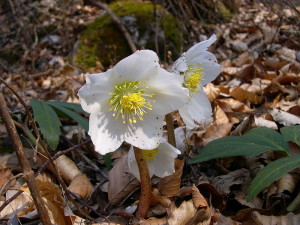Helleborus niger, commonly called Christmas rose or black hellebore, is an evergreen perennial flowering plant in the buttercup family, Ranunculaceae. It is poisonous.
Although the flowers resemble wild roses (and despite its common name), Christmas rose does not belong to the rose family (Rosaceae).
Contents
Uses
In the early days of medicine, two kinds of hellebore were recognized: black hellebore, which included various species of Helleborus, and white hellebore (now known as Veratrum album or “false hellebore”, which belongs to a different plant family, the Melanthiaceae). “Black hellebore” was used by the ancients to treat paralysis, gout and particularly insanity, among other diseases. “Black hellebore” is also toxic, causing tinnitus, vertigo, stupor, thirst, a feeling of suffocation, swelling of the tongue and throat, emesis and catharsis, bradycardia (slowing of the pulse), and finally collapse and death from cardiac arrest. Research in the 1970s, however, showed that the roots of H. niger do not contain the cardiotoxic compounds helleborin, hellebrin, and helleborein that are responsible for the lethal reputation of “black hellebore”. It seems that earlier studies may have used a commercial preparation containing a mixture of material from other species such as Helleborus viridis, green hellebore.
Benefits
Nervous System Disorders:
Individuals who suffer from a condition such as nervous system disorders may come across as having a mental disorder.
Helleborus may help to act as a homeopathic remedy in helping to restore some of the lost concentration and inability to focus. These individuals can’t remember much and they often drop items or go completely blank suddenly without warning In extreme cases, they may even develop a condition similar to Alzheimer’s disease.
Headaches:
This is usually a headache or a more extreme migraine that comes about after an injury or some type of surgery. It may be experienced as pain in the back of the head that spreads, and there may be dizziness associated with it.
Brain Inflammation:
There may be swelling in the brain tissue that could be caused by meningitis. Hellborus may work as a homeopathic remedy to help the body naturally reduce the actual swelling or for symptoms such as extreme hot or cold feelings or even a sort of stupor.
Digestive Disorders:
There are normally painful bowel movements associated with this health condition. This can include a cycle of extreme bowel movements and then constipation as a person continues to suffers through this.
Depression:
Helleborus is recommended when someone is experiencing blank stares, involuntary sighs, and if they happen to be in a dark mood that doesn’t seem to go away with time or adequate sleep.
Cautions
None are recorded. Please consult with your doctor!
Interactions
Not enough information
Other names
Helleborus, Black Hellebore, Christmas Rose
References
Source: Wikipedia, https://en.wikipedia.org/wiki/Helleborus_niger
Homeremedycentral, http://www.homeremedycentral.com/en/homeopathic-remedies/homeopathy/helleborus.html


This is an amazing ingredient that I found to be extremely effective for me because I use it daily thru the use of Dr. King’s product called “Anti-Aging & Wrinkles for Men”. It has helped me reduce my wrinkles and it has probably saved me from a bunch more! I am sure there are a lot of places to get it, but I also found a website that gives me more information about this and the other ingredients, it is called http://www.WONMarketplace.com. Thank You Dr. King and King Bio!